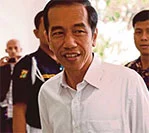BALANCING ACT: While appointing technocrats to his cabinet may help de-politicise governance, Jokowi must take care not alienate politicians
INDONESIA’S future President Joko Widodo has finally announced the likely composition and structure of his up-coming cabinet, and few seasoned Indonesia-watchers are surprised by the revelations thus far.
In what appears to be a compromise of sorts, the future president has stated that the upcoming government will consist of 34 ministries and departments, and that 18 of the future cabinet ministers will come from technocratic-professional backgrounds, while 16 will be politicians from parties that are part of the winning coalition.
That most of the future ministers and department heads will come from a professional, perhaps even non-political background, tells us something about the future president’s commitment to making the changes that are deemed necessary as part of his grand “mental revolution” plan.
And that 16 of the cabinet ministers come from political parties — including his own PDI-P — tells us about the need to forge a working compromise between the major political players in the country.
That Jokowi has taken this pragmatic approach and has appointed so many technocrats to his government is not a novel thing: those whose memories go back to the Suharto era will recall that the 32-year rule under President Suharto also witnessed the rise of the technocratic elite in the country, and that was a time when key non-party-political entities, such as research centres and think tanks, began to boom.
This was the period of the so-called “Berkeley elite”, where foreign-educated technocrats were invited back to the country to helm key industries, such as petroleum and gas mining, Indonesia’s tentative steps into higher-end industrial manufacturing.
It was also a period when the New Order under Suharto was keen to de-politicise Indonesian society and minimise the social friction that may arise from inter-party feuds and politicking. The net result was the emergence of a new Western-educated technocratic-professional class, who later planted the seeds of the rising middle classes that we see today.
But Jokowi’s decision to include so many technocrats and professionals in his cabinet may also be linked to new societal factors that were not prevalent in the past. Earlier this year, in the lead-up to the elections, numerous public polls and surveys were conducted by polling agencies in the country. Among the more startling results of these polls were the revelations that most Indonesians place more faith in the private sector and the media rather than political parties.
Political trust has eroded among many sections of Indonesian society, and it was interesting to note that the surveys found that many ordinary Indonesians felt that party politics was morally bereft, that corruption was normal, and public faith in political rhetoric was at an all-time low.
Having campaigned all year-long to bring about a radical change in the mindset and working culture among ordinary Indonesians across the country, the changes we see now are in keeping with the broad outlines of the “mental revolution” that Jokowi has been talking about: removing the post of deputy minister for all ministries is part and parcel of his effort to trim down unnecessary politicking, lobbying and paperwork, and may also go some way towards speeding up the process of Jokowi comes to power at a turning point in Indonesia’s history, and when external variable factors, ranging from the American “pivot” in Asia, to China’s growing assertiveness in the South China Sea, the growing trade links and diplomacy between China and India, and all point to the rising importance of Southeast Asia in world affairs.
Many Indonesian politicians and policymakers are aware of this, and wish to capitalise on Indonesia’s obvious geostrategic importance, though this can only happen if and when Indonesia gets its act together and resolves its own internal domestic challenges that are equally complex, and which range from its crippling energy and logistics needs to the fear of rising religio-political violence as a result of citizens getting themselves involved in the violence in Syria and Iraq.
How all these issues are to be tackled at the same time, and in time to ensure that Indonesia continues to maintain healthy growth for the next two decades, is going to be the single biggest challenge for Jokowi and his government over the next five years. And the technocrats and professionals who will be part of that transformation process know that Indonesia’s challenges can only be met with pragmatic and realistic solutions, and not empty, though sweet, political rhetoric and promises.
In the weeks to come, the names of the future ministers will probably be released and the public will have a better idea of what this coming government is going to look like. In the meantime, Jokowi also has to ensure that by foregrounding professionals and technocrats as he is likely to do, he does not alienate the powerful politicians and kingmakers who may not be comfortable if their respective parties are marginalised and not given enough clout in the management of state affairs. Altogether, an interesting episode of Indonesian history is about to begin, and the challenge begins now.
Article by Dr. Farish Noor which appeared in New Straits Times,
22 September 2014.





